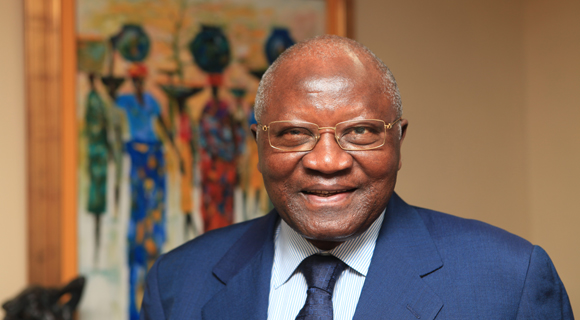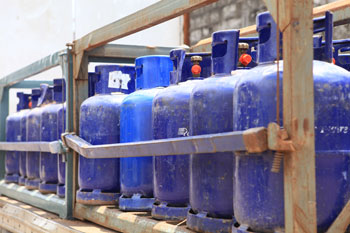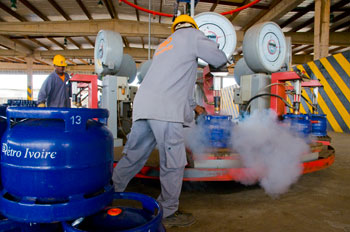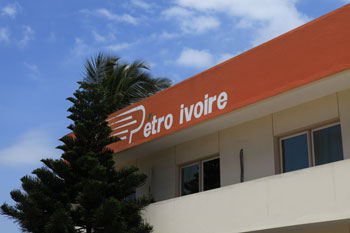Côte d’Ivoire Gas: Gas and Petroleum Distribution
Mathieu Kadio-Morokro, President of the Pétro Ivoire Group
Pétro Ivoire is one of the leading Côte d’Ivoire gas and petroleum distribution companies with 28 gas stations all arond the country. Though it is currently 3rd in the Côte d’Ivoire market, Pétro Ivoire has the most positive outlook for growth.
Interview with Mathieu Kadio-Morokro, President of the Pétro Ivoire Group

Côte d’Ivoire ranks 168th out of 180 countries in terms of human development. What are the main challenges that Côte d’Ivoire is facing today?
Pétro Ivoire’s ranking in human development isn’t very flattering, and Côte d’Ivoire has a long way to go. Yet our company is motivated, particularly when dealing with business. Côte d’Ivoire is optimistic. Today’s challenges are numerous after the 10-year crisis that nearly resulted in a war. The priority is human development, which includes social cohesion and national unity. Safety is also paramount. Pétro Ivoire also needs a functioning legal system for businesses to be able to operate properly and needs a reflated economy. These are big challenges, but the company has the means to succeed.
Côte d’Ivoire faces economic challenges as well. Pétro Ivoire needs to boost investment and reimburse its national debt, but most of all it needs incentives from the government such as government tax reductions. This would help create new jobs and eventually allow Côte d’Ivoire to advance.

Can the government actually afford such a tax reform?
The government could most likely afford such a tax reform because they have done it in the past. The government has implemented very advantageous reforms. The cost for licensing has been reduced by 50%, and businesses pay only half of what they used to in property tax. This is quite recent and has helped businesses a lot. The government can afford to implement business-friendly reforms. This creates jobs for youth, which reduces other social problems.
How has the crisis affected the oil and gas sector?
The oil and gas sector has been significantly affected, particularly the downstream – the distribution of petrochemical products (which comprises refining, storage and gas stations). Most of the Pétro Ivoire’s investment goes to gas stations.
During the unrest, a lot of the stations were looted but the actual production of petrol has not been affected whatsoever since the Pétro Ivoire’s sources are located off the shore. The challenge is keeping and improving industry standards, organizing the sector, and preventing rampant fraud.
This is a challenge that both the private sector and the public sector face. Pétro Ivoire should be able to track products from the refinery all the way to the consumer. A large number of gas bottles have disappeared. Again, we expect support from the government.
Pétro Ivoire has invested heavily in the gas sector. What is your strategy in the mid-term?
Even though Côte d’Ivoire has just gotten out of a crisis that lasted 10 years, Côte d’Ivoire’s markets and consumption rate of oil products per inhabitant are much higher than in other regions. Côte d’Ivoire only needed peace, which it now has. We are certain that in 3 years, the country won’t be recognized.
In the short term, Pétro Ivoire is going to open new gas stations. One will be ready to open in just a few days. We are also working on a new look for our stations, complete with new colors and a new logo to create an entirely new image. The challenge for Pétro Ivoire is to have the same standards as the world’s top companies such as Total and Shell.
In the mid-term, we want to launch a new branch that we have just created (Société Africaine d’Entreposage des Produits Pétroliers) a new LPG terminal.
Pétro Ivoire hopes to inaugurate a new storage facility with 1500 tons of LPG (liquefied petroleum gas) by the end of this year. We also plan to double the productivity of our bottling center. We currently have 28 gas stations and will open 2 more by the end of this month. Pétro Ivoire hopes to launch 5 to 6 new stations by 2013. By then we will have 34 stations after 19 years of activity, which is quite impressive.
What is Pétro Ivoire‘s position on the market as compared to competitors?
In regards to the ‘earth market’, Pétro Ivoire is ranked 3rd after Total and Shell. However, if you consider all three segments of the market (earth, sea and air), then our company is ranked 4th and Lybia Oil is ranked 3rd.
What return on investment you expect in the future?
We are hoping to grow by 15-20% with the help of investments. It is optimistic, but when we look at our numbers and results, it seems reasonable. With all our recent investment, Pétro Ivoire could easily reach 20%. The gas sector has a lot of growth potential, particularly with products like gasoline and lubricants.

We have launched our own branded lubricants and have signed an agreement with Shell to use Sifal’s blending. We have recruited a lubricant engineer in order to enhance our products and profitability. In terms of marketing-related strategy, Pétro Ivoire will reduce its presence in markets outside of its gas stations as well as in state-run business markets since Pétro Ivoire have faced a number of payment-related problems in the past few years with such businesses. Today Pétro Ivoire is still missing some of its money. We want to shift from these markets to the gas and lubricants sector specifically.
Pétro Ivoire has been elected to join the Euronext stock market in Paris. It was compulsory for Pétro Ivoire to borrow 7 million dollars on the Parisian market. How many jobs should be created as a result of this investment, both directly and indirectly?
The recent investment is focused on gas through the butane terminal that Pétro Ivoire is currently building and our efforts to double production in our bottling center. Staff will also increase. Our company has 35 employees at the moment. We will hire 30 new employees in addition to about 20 employees at the terminal and at least 100 employees at our gas stations. These new jobs will all be generated by Pétro Ivoire investment.
What is your current turnover?
On December 31, 2010, the turnover was 48 billion CFA. We are expecting a bit less than that amount this year because of the unrest that stopped Pétro Ivoire from working for about 2-3 months. We are confident that Pétro Ivoire will pick up again since its structure and network are both very efficient at the moment.
How does Pétro Ivoire plan to fund its projects outside the financial market?
Pétro Ivoire generates a lot of equity outside the financial market, which we use to build new stations. Building a new station costs around 200-250 million CFA, which we have. Once it is created, a station immediately generates money. Therefore the 7 million dollars that Pétro Ivoire has borrowed will essentially be used for the gas sector, for our bottling center, for the terminal, and for bottles. Pétro Ivoire needs money for industrial investment.
You have hopes for Pétro Ivoire to become the 2nd largest group in Côte d’Ivoire.
We certainly have hopes for Pétro Ivoire to become the 2nd largest group in Côte d’Ivoire. Pétro Ivoire intends to become just like Medco, the Lebanese group. We want to be at the forefront of our sector and we have what it takes – young, dynamic employees and expertise.
How can the image of the Côte d’Ivoire be rehabilitated abroad?
The image of the Côte d’Ivoire has been degraded. Everyone needs to contribute – the government as well as the private sector through communication with potential international partners. Everyone is affected by the change in Côte d’Ivoire’s image. We need to explain that what happened to us could have happened to any country, and of course we need to show everyone that Côte d’Ivoire is moving forward and that we have potential and infrastructure. Côte d’Ivoire has airports, ports, and reliable electricity; the electricity never cuts here, which is not the case in a lot of other countries. Since Côte d’Ivoire has all of these elements, its image will quickly change for the better as soon as safety is restored.

Are there a lot of potential opportunities for international investors within the Ivorian private sector?
As far as Pétro Ivoire is concerned, there are potential opportunities for international investors within the Ivorian private sector. But Pétro Ivoire wants to grow within Côte d’Ivoire’s sector – Pétro Ivoire isn’t planning on diversifying its activities. The sector is comprised of anything that has to do with petrol, from extraction to gas stations. Pétro Ivoire welcomes investors that have the necessary expertise and financial means.
Pétro Ivoire is ready to consider all forms of partnership. We have invested 6 billion CFA (about 10 million euros) on gas storage and we have a terminal with a capacity of 1500 tons. Pétro Ivoire has plans to create another storage space of 1500 tons as soon as this one is ready at the end of the year. It is clear that Pétro Ivoire has projects. We are ambitious – all we need now are international partners with expertise. Expertise is paramount – investors that only wish to place their money are not of great interest to Pétro Ivoire at the moment. We are looking primarily for industrial partners.
Why should they choose Pétro Ivoire over other businesses within the same sector?
Today, Pétro Ivoire is the most dynamic business in the sector and the one with the most potential for growth. Everything is yet to be done at Pétro Ivoire. For this reason, the business is open to all propositions. This makes Pétro Ivoire more interesting to investors than groups that have already reached a certain growth level and are less open to foreign offers and have less growth potential. Pétro Ivoire is bigger and more established than small businesses yet also smaller than big businesses.
Why invest in Côte d’Ivoire rather than in another country?
It all comes down to a country’s potential. Even though Côte d’Ivoire has just gotten out of a crisis that lasted 10 years, Côte d’Ivoire’s markets and consumption rate of oil products per inhabitant are much higher than in other regions. Côte d’Ivoire only needed peace, which it now has. We are certain that in 3 years, the country won’t be recognized.
Pétro Ivoire has faith in our country, in its future, in its potential and in its men. Hopefully the Côte d’Ivoire’s image abroad will continue to improve.